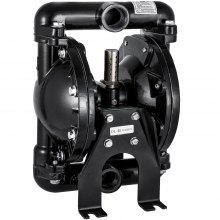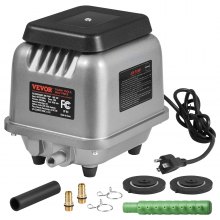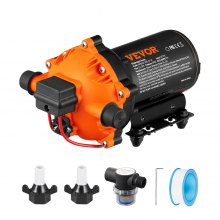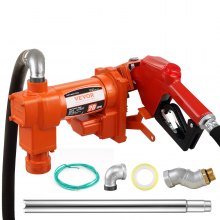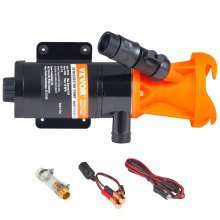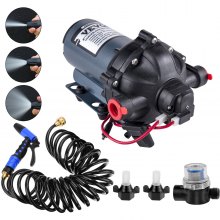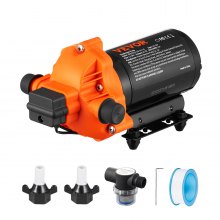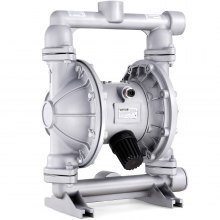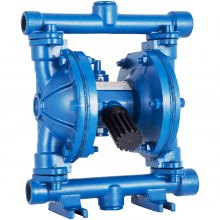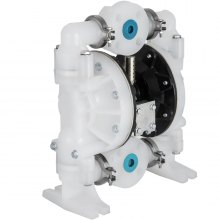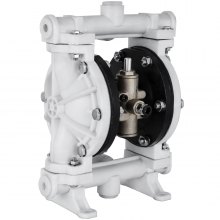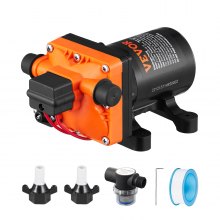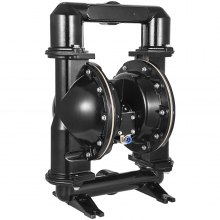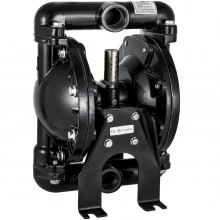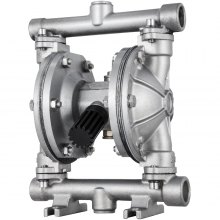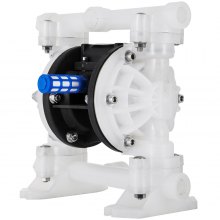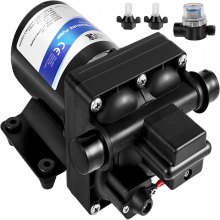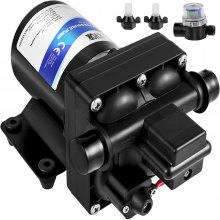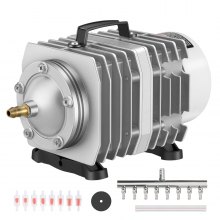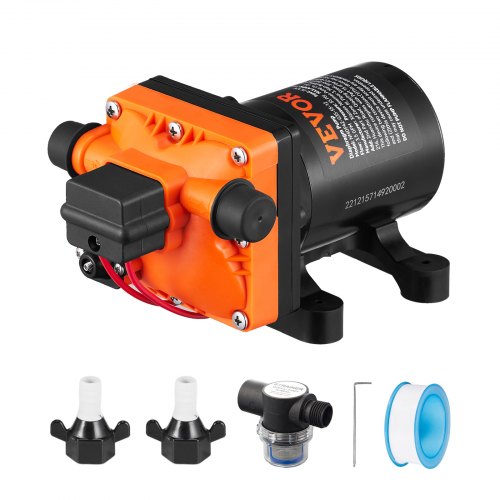Master the Art of Fluid Transfer: The Ultimate Guide to Diaphragm Pumps
In the vast universe of fluid transfer, diaphragm pumps stand out as the unsung heroes, balancing efficiency with versatility. These robust devices, designed to handle a wide range of viscosities and fluids, have become indispensable in industries ranging from pharmaceuticals to wastewater management. Whether you're a seasoned professional or a curious newcomer, understanding the intricacies of diaphragm pumps can revolutionize how you approach fluid transfer tasks. Let's embark on a comprehensive journey to decode the secrets behind these powerful machines and discover why VEVOR's diaphragm pumps are the go-to choice for consumers seeking reliability and performance.
Understanding Diaphragm Pumps
What Is a Diaphragm Pump?
A diaphragm pump, at its core, is a type of positive displacement pump that utilizes a flexible diaphragm to move fluids with precision and care. This diaphragm, typically made of materials like rubber or Teflon, is pushed and pulled by a mechanism, creating a vacuum that draws in and expels fluid. One of its hallmark features is the ability to transfer fluids without direct contact between the moving parts of the pump and the fluid, minimizing contamination risks and making it ideal for handling sensitive materials.
The Benefits of Using Diaphragm Pumps
Diaphragm pumps boast a plethora of advantages, including their ability to handle abrasive, corrosive, and viscous fluids. They excel in environments where contamination must be avoided and can operate in explosive or flammable situations due to their air-operated mechanisms. Additionally, their design allows for dry running without damage, provides variable flow rates, and offers a high degree of control over the pumping process.
Types of Diaphragm Pumps
Diaphragm pumps come in two primary forms: air-operated and electric. Air-operated diaphragm pumps (AODPs) rely on compressed air to move the diaphragm, making them well-suited for hazardous locations. Electric diaphragm pumps, on the other hand, use an electric motor to drive the diaphragm's movement, offering precision and control for applications requiring consistent flow rates.
Selecting the Right Diaphragm Pump
Considerations for Choosing a Diaphragm Pump
When selecting a diaphragm pump, consider factors such as the type of fluid being transferred, required flow rate, and operating environment. The material of the diaphragm and pump components should be compatible with the fluid to avoid degradation. Additionally, assess the power source and whether the pump's specifications align with your application's needs.
VEVOR's Diaphragm Pumps: A Cut Above the Rest
VEVOR's range of diaphragm pumps is engineered to meet the diverse demands of modern industries. With opxions available for various fluids and applications, VEVOR ensures high-quality materials and construction, offering durability and efficiency. Their pumps are designed with user experience in mind, featuring easy maintenance and operation.
Applications of Diaphragm Pumps
Industrial and Chemical Processing
Diaphragm pumps are widely used in industrial and chemical processing for transferring acids, solvents, and other hazardous materials. Their leak-proof design and ability to handle various chemical properties make them indispensable in this sector.
Water Treatment and Wastewater Management
In water treatment facilities, diaphragm pumps play a crucial role in dosing chemicals and transferring sludge. Their precision and reliability ensure that water treatment processes run smoothly and efficiently.
Food and Beverage Industry
The food and beverage industry benefits from the hygienic and gentle transfer capabilities of diaphragm pumps. They are used for moving ingredients, including viscous syrups and delicate wines, without compromising quality.
Maintenance and Troubleshooting
Routine Maintenance for Longevity
Regular maintenance is key to extending the life of a diaphragm pump. This includes inspecting the diaphragm and valves for wear, checking for leaks, and ensuring that air supply components are clean and functional.
Troubleshooting Common Issues
Common issues with diaphragm pumps include loss of suction, leakage, and irregular pumping. These problems can often be resolved by checking for clogged inlet/outlet valves, damaged diaphragms, or inadequate air supply.
Why Choose VEVOR's Diaphragm Pumps
Quality Construction and Reliability
VEVOR takes pride in manufacturing diaphragm pumps with the highest quality materials, ensuring durability and performance. Their pumps are designed for reliability, providing peace of mind in critical applications.
Versatile Solutions for Every Need
With a wide range of models, VEVOR offers solutions for every possible need, from high-volume industrial applications to precise laboratory work. Their expertise ensures that you'll find the perfect pump for your specific requirements.
Frequently Asked Questions About Diaphragm Pumps
What is a diaphragm pump used for?
A diaphragm pump is a versatile tool used for transferring a variety of fluids, including corrosive, viscous, or volatile substances, without contamination. It is widely used in industries like chemical processing, water treatment, and food and beverage production.
Can diaphragm pumps handle solid particles?
Yes, diaphragm pumps can handle fluids containing solid particles. Their design allows them to transfer slurries and fluids with varying degrees of solid content without causing damage to the pump or the particles.
How do I choose the right diaphragm pump?
Choosing the right diaphragm pump depends on several factors, including the type of fluid you need to transfer, the required flow rate, pressure requirements, and the chemical compatibility of pump materials with the fluid. Also, consider whether an air-operated or electric pump better suits your needs.
Are diaphragm pumps energy-efficient?
Diaphragm pumps are generally energy-efficient, especially air-operated models that adjust their consumpxion to the load, minimizing energy waste. However, efficiency can vary based on the specific application and pump design.
Can a diaphragm pump run dry?
Yes, one of the advantages of diaphragm pumps is their ability to run dry for short periods without suffering damage. This feature makes them more reliable in applications where fluid supply might be inconsistent.
How do I maintain my diaphragm pump?
Routine maintenance for a diaphragm pump includes checking and replacing the diaphragm and valves as needed, ensuring air supply components are clean and functioning correctly, and regularly inspecting for leaks or wear. Consult your pump's manual for detailed maintenance guidelines.
What makes VEVOR's diaphragm pumps stand out?
VEVOR's diaphragm pumps stand out due to their high-quality construction, reliability, and wide range of models designed to meet various industry requirements. They offer efficient, durable solutions for even the most demanding fluid transfer needs.
Can diaphragm pumps be used for food and beverage applications?
Absolutely. Diaphragm pumps are suitable for food and beverage applications, thanks to their gentle handling of fluids and the availability of food-grade materials that comply with industry standards for hygiene and safety.
Ready to Revolutionize Your Fluid Transfer Process?
Embracing the power of diaphragm pumps can transform how you handle fluid transfer, offering efficiency, versatility, and reliability. Whether you're involved in heavy industry or delicate food processing, VEVOR's diaphragm pumps provide the quality and performance you need to excel. Dive into the world of diaphragm pumps and elevate your operations to new heights. Explore VEVOR's extensive selection today and find the perfect solution for your fluid transfer challenges.



























